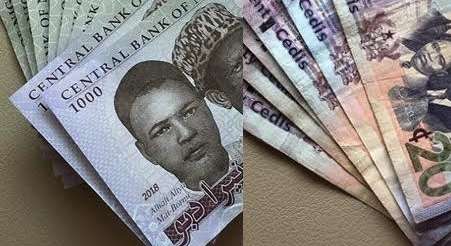
According to the World Bank’s latest economic update, the Ghanaian cedi and Nigerian naira are among the four worst-performing currencies in Sub-Saharan Africa in 2024.
The report, which highlights the economic struggles of the region, paints a challenging picture for both nations as inflation, political instability, and global economic pressures continue to weigh down their economies.
The Decline of the Cedi and Naira
In the case of Ghana, the cedi has experienced significant depreciation, losing much of its value in foreign exchange markets.
In early 2024, the cedi recorded one of the steepest drops among African currencies, a continuation of the decline it has been facing since 2022.
The devaluation has led to increased import costs, worsening inflation, and a spike in the cost of living for Ghanaians.
The World Bank attributes the cedi’s poor performance to factors including high public debt, government fiscal mismanagement, and global factors like rising interest rates in developed markets that have siphoned capital away from emerging economies.
Similarly, Nigeria’s naira has faced severe depreciation in 2024, exacerbated by the country’s foreign exchange policies and structural economic issues.
The naira’s value has been under constant pressure due to Nigeria’s reliance on oil exports, dwindling foreign reserves, and a wide gap between the official and parallel market exchange rates.
The government’s attempts to unify these rates in 2023, while initially promising, have not been enough to reverse the naira’s downward trend.
This, coupled with political uncertainty and high inflation, has made the naira one of the worst-performing currencies in the region.
Contributing Factors
1. High Inflation and Debt Levels: Both Ghana and Nigeria have been grappling with high inflation rates, which have eroded purchasing power and investor confidence.
Ghana, in particular, has been dealing with inflation above 40% in 2023, while Nigeria’s inflation rate remains in the double digits, fueled by rising food and energy costs.
2. Monetary and Fiscal Policies: The World Bank report criticizes the monetary and fiscal policies of both nations, noting that inconsistent policy frameworks have aggravated economic instability.
Ghana’s over-reliance on borrowing and unsustainable debt levels have worsened investor sentiment, while Nigeria’s opaque foreign exchange regime has deterred foreign investments and capital inflows.
3. Global Economic Environment: Global factors, such as rising interest rates in advanced economies and a slowdown in China’s economy, have had a ripple effect across Sub-Saharan Africa.
Investors have shifted funds to safer assets, leaving emerging market currencies like the cedi and naira vulnerable to devaluation.
Impact on the Economies
The depreciation of the cedi and naira has had significant economic and social impacts on both countries.
In Ghana, the cost of imported goods has skyrocketed, worsening inflation and increasing the cost of living for everyday Ghanaians.
In Nigeria, the naira’s depreciation has triggered an outcry among citizens, especially as the government recently removed fuel subsidies, leading to a sharp rise in transportation and commodity prices.
Businesses in both countries have also felt the pinch. With rising import costs and limited access to foreign exchange, many companies have struggled to maintain operations, leading to reduced production and layoffs.
For multinational companies, the currency volatility has increased the cost of doing business, prompting some to reconsider investment plans in both countries.
Future Perspectives
The World Bank’s outlook for both the cedi and naira remains cautious.
While the report notes some efforts by the governments of Ghana and Nigeria to stabilize their economies, it warns that significant structural reforms are needed to address underlying weaknesses.
For Ghana, implementing fiscal discipline and reducing reliance on debt are crucial to restoring investor confidence.
In Nigeria, reforms in the oil sector, as well as efforts to improve foreign exchange management, are key to reversing the naira’s slide.
As Sub-Saharan Africa continues to face global and domestic challenges, the performance of its currencies will play a pivotal role in shaping its economic future.
Meanwhile, the World Bank emphasizes the need for comprehensive reforms to improve macroeconomic stability and restore growth in the region.
